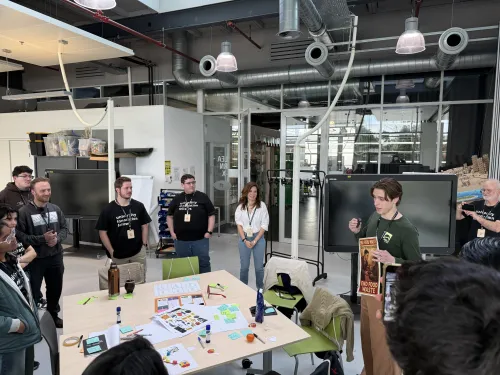Our programs are built for students who want to co-create their education. Mix and match majors and minors to gain the skills and inspire the mindsets you need to succeed on your journey.
Make Business Your Creative Outlet

At Ithaca College School of Business, we don’t just teach about business. We nurture creative problem solving through theory, practice, performance. We offer an immersive education–four years of active learning, surrounded by faculty and alumni mentors, connected with the business world, and rooted in collaboration with world-class schools of communications & media, health sciences, and the arts.
Majors, Minors, and Departments

If creative problem-solving is what we teach and immersive education is how we teach, shouldn’t those values be reflected in where we teach? Get to know our Leed Platinum certified building and get a sense for how we live our values in the spaces where we learn.
Facts & Stats
Almost 100% of School of Business students complete at least one internship during their time at Ithaca College.
U.S. News & World Report ranked IC highly for our commitment to teaching undergraduate students in a high-quality manner
With a 5 out of 5 rating on the Campus Pride Index, IC is deeply committed to inclusive programs, policies, and services for LGBTQ+ students — and started National Pronoun Day.
Ithaca College is one of the Top 5% of business schools in the world that is AACSB accredited.
Ithaca College has been named as one of the nation’s most environmentally responsible colleges by The Princeton Review for 2026.
Poets&Quants gave us a high ranking for alumni engagement when compared to other undergraduate business programs across the country.
Featured News



Support our innovative programs and help us build the business school of tomorrow.
SCHOOL OF BUSINESS DEAN'S OFFICE
3rd Floor, Park Center for Sustainable Enterprise
953 Danby Rd. • Ithaca, NY 14850
Visit the Student Services Team Desk in the Business School Dean's Suite, 10:00 AM to 5:00 PM with any questions or concerns. Ask a question, learn about resources, chat about life in the School of Business, and more!
To schedule a meeting with Associate Dean Dawn Kline or Academic Services Coordinator Katy Hall, visit the links below:
Dean Kline
Katy Hall